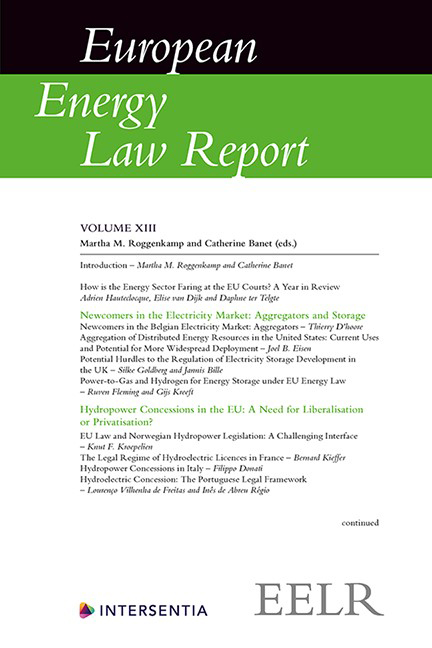Book contents
- Frontmatter
- Preface
- Contents
- List of Abbreviations
- List of Contributors
- Introduction
- Chapter I How is the Energy Sector Faring at the EU Courts? A Year in Review
- PART I NEWCOMERS IN THE ELECTRICITY MARKET: AGGREGATORS AND STORAGE
- PART II HYDROPOWER CONCESSIONS IN THE EU: A NEED FOR LIBERALISATION OR PRIVATISATION?
- PART III INVESTMENTS AND DISINVESTMENTS IN THE ENERGY SECTOR
- PART IV OFFSHORE DECOMMISSIONING IN THE NORTH SEA
- PART V CCS AS A CLIMATE TOOL: NORTH SEA PRACTICE
- PART VI FROM EU CLIMATE GOALS TO NATIONAL CLIMATE LAWS
Chapter VIII - Hydropower Concessions in Italy
Published online by Cambridge University Press: 30 April 2020
- Frontmatter
- Preface
- Contents
- List of Abbreviations
- List of Contributors
- Introduction
- Chapter I How is the Energy Sector Faring at the EU Courts? A Year in Review
- PART I NEWCOMERS IN THE ELECTRICITY MARKET: AGGREGATORS AND STORAGE
- PART II HYDROPOWER CONCESSIONS IN THE EU: A NEED FOR LIBERALISATION OR PRIVATISATION?
- PART III INVESTMENTS AND DISINVESTMENTS IN THE ENERGY SECTOR
- PART IV OFFSHORE DECOMMISSIONING IN THE NORTH SEA
- PART V CCS AS A CLIMATE TOOL: NORTH SEA PRACTICE
- PART VI FROM EU CLIMATE GOALS TO NATIONAL CLIMATE LAWS
Summary
INTRODUCTION
This chapter is intended to offer a brief description of the hydropower concessions system in Italy. It is divided into three parts. First, it describes the evolution of the Italian legislation on hydropower concessions (Section 2). Then, it reviews the infringement procedure initiated by the European Commission and still pending against Italy (Section 3). Finally, it addresses the issue concerning the consistency of the Italian hydropower concessions regime with EU competition principles (Section 4). The chapter ends with some concluding remarks (Section 5).
EVOLUTION OF ITALIAN LEGISLATION ON THE DURATION OF CONCESSIONS
The Italian legislation on hydropower concessions has gradually evolved from a State monopoly to a sector subject to competition. In this regard, three main periods can be identified.
PERIOD OF STATE MONOPOLY
In the first period, from 1933 until the beginning of the 1990s, a State monopoly excluded any competition in the hydropower sector.
Initially, the exploitation of water resources for energy production was carried out by private operators. However, with the entry into force of decree n. 1775 of 1933, setting forth a consolidated text on legislation regarding water resources (the “Water Consolidation Act”), such operators lost the possibility to have their hydropower concession renewed. According to such legislation, upon expiry of the ongoing concession, the State acquired ownership and possession of the hydropower plant. In particular, the Water Consolidation Act provided that, upon expiry of the concession, the so-called “wet works” (dams, pipes and, in general, underwater infrastructures) would be conveyed, free of charge, into State ownership (article 25, paragraph 1). The so-called “dry-works” (the infrastructures on the ground), on the other hand, would remain the property of the concessionaire, unless the State had exercised its option to buy. In such a case, the Water Consolidation Act prescribed a criterion for the calculation of the purchase price, according to which the value of the infrastructures had to be determined without considering the revenues obtainable through them (article 25, paragraph 2).
The State monopoly over the hydropower sector was later confirmed by Law n. 1643 of 1962, which nationalised the entire electricity sector and reserved to a State-owned company, ENEL, the production, transport and distribution of energy (with exceptions for local authorities and self-producers). Given such reserve, hydroelectric concessions granted to ENEL had a perpetual nature.
- Type
- Chapter
- Information
- European Energy Law Report XIII , pp. 165 - 172Publisher: IntersentiaPrint publication year: 2020



